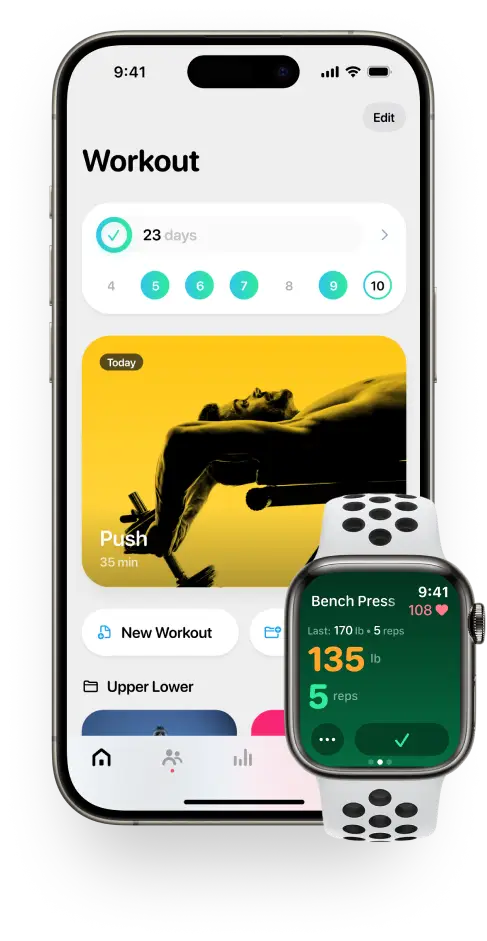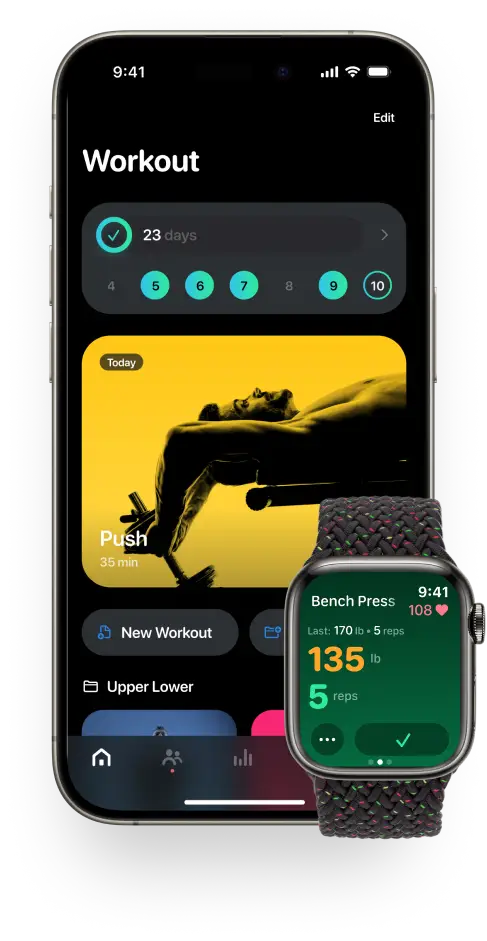Is a Dirty Bulk Worth It? Pros and Cons
Find out how you can gain muscle without getting fat and how excess fat impacts your body. Learn how to get big and maintain your gains.
What is a Dirty Bulk
If you are looking to get a bulkier physique rather than a lean one, you’ve probably begun to explore weight gain techniques you can try to pack on some pounds.
The big, bad dirty bulk means eating as much as you can as quickly as you can.
This bulking type requires calories at all costs. Dirty bulking is a method to eat more calories and gain weight, by consuming foods like pizza, pastries, pasta, and burgers.
Weightlifters sometimes use this method briefly, then enter a "cut" phase to convert the extra weight into toned muscles.
Dirty Bulk vs. Lean Bulk
In the bodybuilding and fitness community, dirty bulking is positioned as the opposite technique to clean bulking.
A “clean” or lean bulk, means gradually increasing your calories to put on weight in a slow and controlled manner.
Usually during a clean bulk, you add on 200-500 extra daily calories to increase your food intake and slowly put on weight.
Typically, lean bulking is a more sustainable technique, since it doesn’t require you to stuff your face, but rather, focuses on incremental caloric increases every day.

Dirty Bulking— Pros
Food Freedom
This method lets you eat basically whatever you want for a set period. If you love sweets or pizza, a dirty bulk encourages you to go for it.
Dirty bulkers do not usually track macronutrients or evaluate the ingredients of what they’re eating, it’s just about eating as much as possible.
If you’re someone who struggles with restrictive eating patterns, this can be a way to break out of limiting habits and allow yourself to enjoy eating things that you like without rules.
Weight Gain
It seems simple but yes, dirty bulking will generally make you gain weight.
Nevertheless, scientific research on this subject shows that a dirty bulk doesn’t necessarily have a positive correlation with putting on more muscle than a clean bulk.
This misconception comes from the idea that dirty bulking makes you gain “more weight,” but you will usually just gain more body fat. Weight can be increased either through steady caloric increases or through unrestricted excess eating.
All that matters here is taking in more calories than you burn.
Dirty Bulking— Cons
Fat Gain
Because of the nature of the foods you eat during a dirty bulk, you’re more likely to increase your body fat through high-fat-content or junk foods.
Excess fat, especially visceral abdominal fat (fat that surrounds the internal organs) has been linked to health conditions including metabolic diseases, high blood pressure, type 2 diabetes, and even sleep apnea.
How long should you bulk for? Eating unhealthy foods for a long time can negatively impact your health. This is especially true if these foods lack nutrition or contain high amounts of saturated or trans fats.
@jeffreygeraldseid— Fitness star Jeff Seid talks about his 40-pound dirty bulk weight gain. Although he gained weight, Jeff says the high blood pressure and excess fat gain were not work the risk.
May Make Athletic Performance Worse
Junk food can make you tired. Eating foods that are not macro and micronutrient dense, can make you feel sleepy or unmotivated.
This can cause sluggishness or lack of interest in performing or completing workouts. So while you would be gaining the weight that you want, a lack of exercise while bulking will not let you effectively channel this weight gain into building healthy muscle.
Overall Poor Health Outcomes
Highly processed or junk foods are low in things like dietary fiber. Fiber is important for processes like blood sugar stabilization, the digestive cycle, and waste elimination.
Too little fiber can cause you to feel bloated, constipated, or overall unwell.
You will also likely be lacking in essential vitamins, minerals, pre-and probiotics, and the other necessary dietary elements that contribute to a feeling of good health.
How to Dirty Bulk
If your heart is set on dirty bulking, try to approach it by adding some “dirty” foods to a “clean” diet.
Although the idea of “good” and “bad” foods can be detrimental, focusing primarily on whole foods like lean protein, leafy greens, fruits, and complex carbohydrates is a good rule of thumb for most healthy individuals unless advised by a medical professional.
To add a “dirty” approach to an otherwise healthy diet, you can add things like desserts, or more snack foods to push your overall daily calories up. That being said, it may not be a good idea to down 7 burger patties covered in cheese at every meal!
Aim for variety in your diet to cover all the major food groups and get your macronutrients in. After that, if you’re looking to gain weight, feel free to cheat with a few less healthy meals or snacks here and there.
As part of an otherwise balanced diet, most research shows that it is okay to incorporate snack foods. Although researchers still need to uncover additional evidence on snack foods, some studies indicate that high-sugar, high-fat snack foods may contribute to weight gain or have no impact on weight.
Dirty Bulk— What to Eat
What should you eat on a dirty bulk?
In this type of bulking program, “anything and everything” is the answer.
That being said, if you can afford to, stick with high-protein food options to promote muscle growth.
These include things like:
- Lean meat
- Chicken
- Turkey
- Tofu
- Fish
Many weightlifters who follow dirty bulking programs also gravitate toward protein supplementation.
During a dirty bulk, the main focus is to gain as much weight as possible in a short time. People make personal choices and increase their calorie intake when they eat.
If any food makes you feel bad, don't force yourself to eat it for more calories. You can eat your usual calories one day and then eat more calories the next day without gaining weight.
Should I Dirty Bulk?
How and how quickly you bulk is down to a matter of personal preference. Although we don’t recommend consuming high-cholesterol foods in excess for long periods of time, some degree of dirty bulking can be effective if you are purely focused on gaining weight.
There are a few categories of people who may find dirty bulking beneficial, or at least can use it to jumpstart a healthier gaining program. These include:
People with Overactive Metabolisms
Everyone has metabolic function differences. Although most people tend to struggle with weight loss, some people struggle to gain weight. This can be attributed to lifestyle factors, age, hormonal issues, and genetics.
Some chronically slim people find the seeming inability to pack on weight frustrating, especially among young men, where a somewhat bulky frame is socially desirable.
In the bodybuilding community, those who train hard but can’t put on weight are referred to as “hard gainers.”
These individuals can benefit from dirty bulking to gain mass since their issue is that they’re not consuming enough calories to gain or even occasionally maintain weight.
Many teenagers may fall into the fast metabolism category, but here we do not recommend dirty bulking. Keep in mind that if you are in your teens you are still growing and should follow a healthy diet.
Only generally healthy adults should attempt this type of diet.
Competitive Athletes
Competitive athletes have different calorie needs than the average Joe. This is especially true if they are involved in weight-based sports.
Martial arts, boxing, and wrestling, for example, all require athletes to “make weight,” or fit into a specific weight range to be paired up against an opponent of similar size.
Although these highly trained individuals frequently go to all types of measures, like wearing sweat suits or wrapping themselves in siran wrap to cut weight before events (many of which are dangerous), the opposite is true and some competitive athletes find themselves needing to bulk up quickly.
Because these athletes usually have trainers and sports nutritionists to supervise their progress and make sure they’re not getting too much cholesterol.
Who Should Not Dirty Bulk
As a general rule, dirty bulking is not advisable over a long period of time. Although it can be an effective way to increase your calorie count and often see some gains, the drawbacks from a health perspective could catch up with you in the future.
Because this diet does not restrict the types of food you eat, lifters also focus on cheap, calorie-dense, and fat laden foods like pizza, burgers, and milkshakes to pack on quick pounds.
Are these foods okay to eat once in a while? Yes. If junk food doesn’t make up the bulk of your diet, you can absolutely enjoy it on occasion in a healthy way.
Foods with too much salt, fat, and cholesterol on a frequent basis, however, are tied to negative health outcomes, including heart attack and stroke.
We advise aiming to eat a primarily health-food-based diet, including leafy greens, lean protein, and complex carbs. If you eat junk food, make sure you are consuming it mindfully and in smaller portions.
Big Picture
Dirty bulking means eating excess calories to gain weight. Here, however, the source of calories doesn’t matter. You can eat as much pizza and as many fries as you like.
This often leads to more junk food consumption, including a lot of fat, which may have adverse cardiovascular effects in the long term. Dirty bulking typically also leads to a quicker intake of calories so you put on mass more rapidly.
Lean bulking (aka clean bulking), on the other hand, means nourishing your body with healthy foods to bulk up. Usually, this process is sustainable and takes place over several months.
Remember that everyone's body responds differently, so it may take some experimentation to find the approach that works best for you. Consistency and patience are key in your bulking process.
If you have any health concerns around bulking or are experiencing adverse effects, talk to a healthcare professional or a registered dietitian. Professionals can help make sure that bulk is healthy for your body when factoring in any health conditions you may have and in the scope of your health history.
Interested in learning more about how to optimize your nutrition for performance?
Read more about different types of supplements like creatine and how they can impact your workouts:
- Creatine Monohydrate vs. Mircronized
- Does Creatine Expire?
- What Happens if You Take Fat Burners Without Working Out?
- Does Pre-Workout Break a Fast
Looking to bulk up your workout routine or cut the fat? Flex AI offers an all-in-one workout platform to help you learn new exercises, visualize your fitness journey, and keep all your PRs in one place.
We’ve made it simple to work on customized fitness plans or to introduce a little friendly competition to your fitness community by sharing exercises with your friends. Try it for free through the Flex fitness app.
Related articles


Get fit with Flex
Build muscle & lose weight fast for free.
Available on iPhone + Apple Watch





